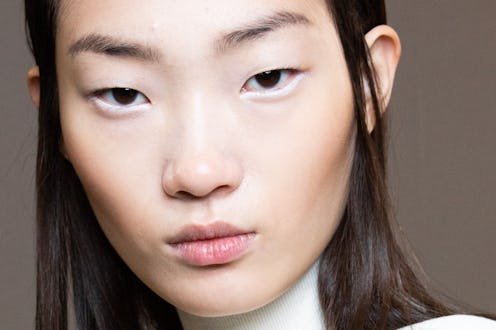(Beauty Science)
This Derm-Recommended Retinol Alternative Is Probably In Your Routine Already

Is there any skin care ingredient more universally adored — or discussed — than retinol? It's been touted as a treatment for wrinkles, acne, and plugged-up pores, and if you can stick with it, you'll get all those skin-glowing, baby-faced results... in time. That said, changing how your skin operates comes with a catch, and it's those cons that have lead to an increase in demand for the best retinol alternatives.
Read more: Can You Use Retinol & Vitamin C Together? Experts Explain
Long story short: Retinol can make your skin dryer, flakier, and just all around unhappy for a variety of reasons, since this is one powerful ingredient you're putting on your face (peeling skin with retinol is a concern for some). "Retinol is a mild version of retinoic acid, [which] is a vitamin A derivative that increases cell proliferation," Dr. Orit Markowitz, a board-certified dermatologist, tells TZR via email. The acid derivative performs similar to your standard chemical exfoliator, while also thickening up the inner layer of your skin and decreasing clogged pores. "This thicker skin appears less wrinkled," adds Markowitz.
Not bad, right? But balance that out with the aforementioned side effects and you might be one of the many people looking for an alternative to retinol that still delivers results. Good news: You have options, and if you understand how retinol actually performs, you'll be able to cut through the beauty industry noise to find one that offers up the effect you're after.
What Are Retinol Alternatives?
Saying an ingredient is a "natural retinol alternative" has become a bingo-card filler in the beauty industry. So, what does it actually mean in layman's terms? "When a brand or product is claiming they are a retinol alternative, they are claiming that their product accomplishes similar anti-aging results that Retin-A does," says Markowitz, using the brand name of tretinoin, or retinoic acid.
In other words, if you were looking into retinol alternatives to mimic the ingredient's acne-clearing power, it might be best to stick with skin care ingredients that are typically associated with acne-prone skin. While a product advertised as a "retinol alternative" might be able to help — depending on what's in it, of course — it also could be a long way to results that ingredients like salicylic acid are known to achieve.
Retinol Alternatives: A Dermatologist's Take
Now, what everyone's been waiting for: the alternatives. First up is bakuchiol, perhaps the most popular retinol substitute. "Bakuchiol is an ingredient derived from the Psoralea corylifolia plant and entered the skin care market in 2007," says Markowitz. "There have been some studies that compare the genetic impact of bakuchiol, which is similar to Retin-A in its ability to improve wrinkles. While bakuchiol isn't regulated the way retinol is, right now it currently is the only other retinol alternative that has been studied in some capacity."
Turns out you shouldn't sleep on ingredients that might already be in your cabinet, too. Markowitz points to glycolic acid and rosehip oil as possible retinol alternatives, although notes that both aren't regulated the same way. "Rosehip oil contains small concentrations of retinoic acids, but because it's not FDA regulated, it's difficult to know what concentration of rosehip oil is included within the product," she explains. "Glycolic acid is an AHA that also is known to boost collagen and elastin in the skin, so it can offer anti-aging benefits."
Perhaps the easiest alternative to retinol if you truly don't want to try a new ingredient? Stick to your current routine and slather on that SPF. "There are many ingredients on the market that can help someone achieve younger-looking skin even though they don't directly target wrinkles," says Markowitz. "I also find the best way to prevent wrinkles or even lessen their appearance is through preventative measures like wearing SPF every day and hydrating your skin with a good sealant moisture that has ceramides."
Though it's understandable if you want to add in something totally new. Ahead, a few options for bakuchiol, glycolic acid, and rosehip oil, as well as SPF and ceramides, so you can see if these retinol alternatives are right for you.
We only include products that have been independently selected by The Zoe Report's editorial team. However, we may receive a portion of sales if you purchase a product through a link in this article.
This article was originally published on